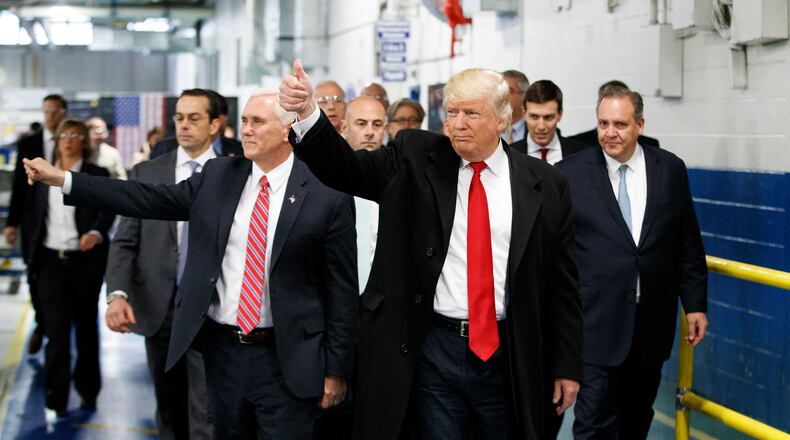Donald Trump was not the kind of presidential candidate who lays out the finer details of his policies on the campaign trail.
Now, as the president-elect assembles his government, the people he is choosing to run it provide a clearer picture of the policies his administration will pursue.
Among them are a lot of plans to privatize government programs, including Medicare, services provided by the Veterans Affairs department, college loans and infrastructure projects.
1) Medicare
Trump's pick to head the Health and Human Services Department, Rep. Tom Price, R-Ga., has championed privatizing the Medicare program for seniors and disabled people.
Last month, Price said he expected the House to push forward with Medicare privatization "within the first six to eight months" of Trump's administration. This could happen through the budget reconciliation process, which would allow the Senate to pass the plan through a simple majority that could not be blocked by filibuster.
Price's "Empowering Patients First Act" calls for providing tax credits, based on age rather than income, to help purchase private health insurance.
Price also helped to craft House Speaker Paul Ryan's plan to overhaul Medicare, which seeks to change the program by providing seniors with a voucher that they could use to purchase private health coverage. Price and Ryan say that privatizing the system would encourage competition and lower health care costs.
Trump himself did not speak as much about Medicare during his campaign, instead focusing on his promise to "repeal and replace" the Affordable Care Act — but he did promise to protect it.
"You can't get rid of Medicare," Trump told reporters. "It'd be a horrible thing to get rid of. It actually works."
2) Department of Veterans Affairs
Trump's transition is being advised by Concerned Veterans for America, a small, conservative organization backed by billionaires Charles and David Koch, who have long supported privatizing veterans' health care. Trump reportedly met with Pete Hegseth, who served as the group's CEO until January this year, about the job of Secretary of Veterans Affairs.
Another person Trump is considering for the position, retiring House Veterans' Affairs Committee Chairman Rep. Jeff Miller, R-Fla., has also worked closely with the CVA.
During the campaign, Trump's Democratic opponent Hillary Clinton called the move to privatize the Veterans Affairs Department a "misguided ideological crusade" that would hurt veterans care.
Some veterans organizations, including the Disabled American Veterans and American Legion, oppose privatizing the VA. They say it would lead to veterans losing the comprehensive, specialized care that civilian doctors may not be able to provide. They worry that the CVA's plan to start turning the system over to the private sector by allowing veterans to see doctors outside the VA medical system would end up dismantling the department's services altogether.
3) Roads and Bridges
Trump's choice to head the Department of Commerce, financier Wilbur Ross, has proposed a plan to privatize infrastructure improvements.
It would create $1 trillion worth of new infrastructure through federal tax credits to construction companies to build new toll roads, toll bridges and other projects that create revenue. The Trump administration would entice private companies to invest $167 billion of their own equity into projects in return for a tax incentive equal to 82 percent of that investment — or roughly $137 billion in government tax breaks.
Critics, including economist Paul Krugman, have said the plan would lead to private investors simply privatizing infrastructure projects that would have happened with or without Trump's plan — but paying only 18 cents on the dollar, while taxpayers cover the rest.
Under President Barack Obama, the federal government offers credit programs that are meant to help states and cities team up with private investors to fund new infrastructure projects.
4) College loans
The Trump campaign indicated that it wanted to remove the government from student loans by overhauling the federal aid system and shifting lending to the private sector. It would return college loans to the way they worked before President Bill Clinton and Obama moved them from private lenders to the federal government. In May, Trump's policy director Sam Clovis told Inside Higher Education that the Trump administration would have private banks lend the money to students instead.
"We think it should be marketplace and market driven," he said.
The federal student loan program offers more than $150 billion in student loans every year, with rates that are fixed for life.
"It's one of the only places, frankly, where the government actually makes money and they make a lot of money, and that should not take place. We're going to make it really good for the students," Trump said in a campaign video during the primaries.
Trump's transition office did not respond to request for comment.
About the Author
Keep Reading
The Latest
Featured



